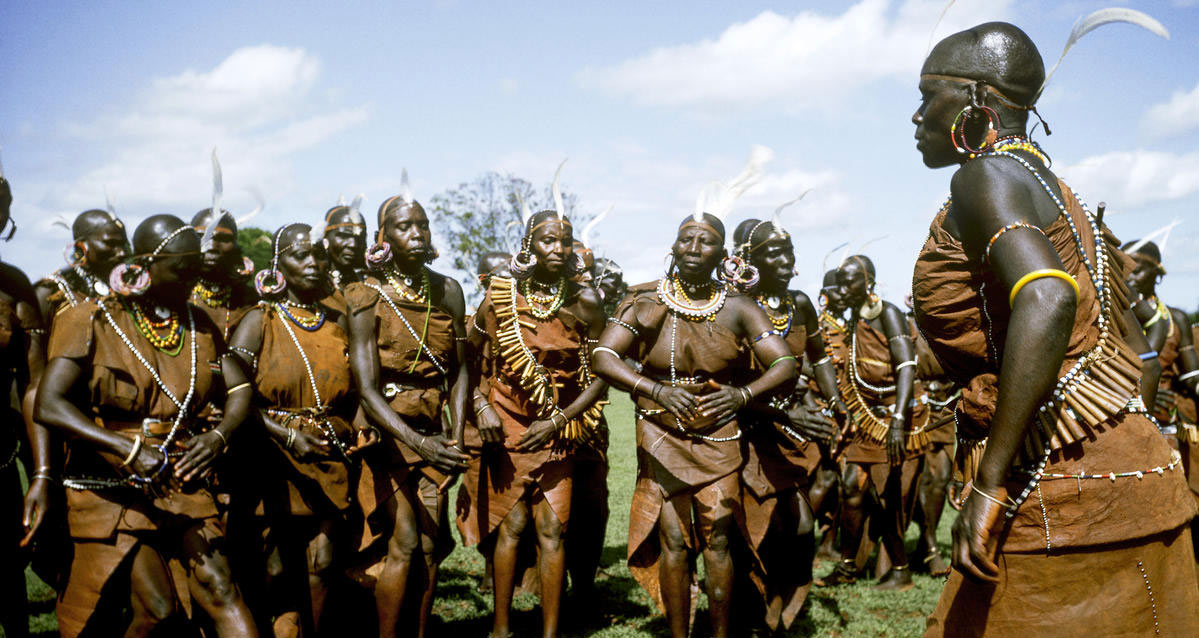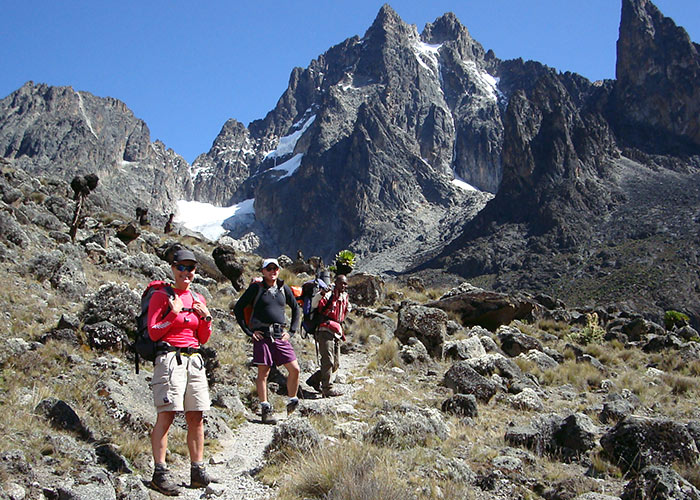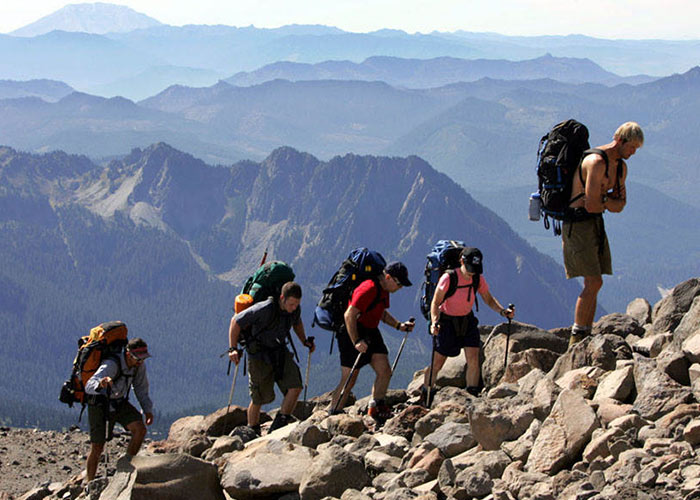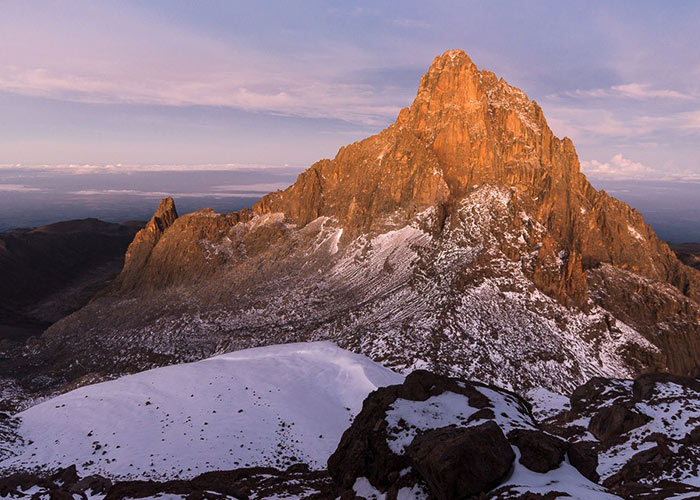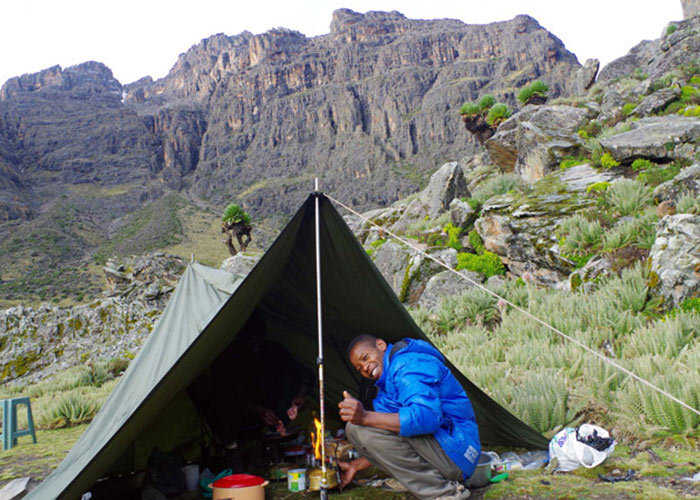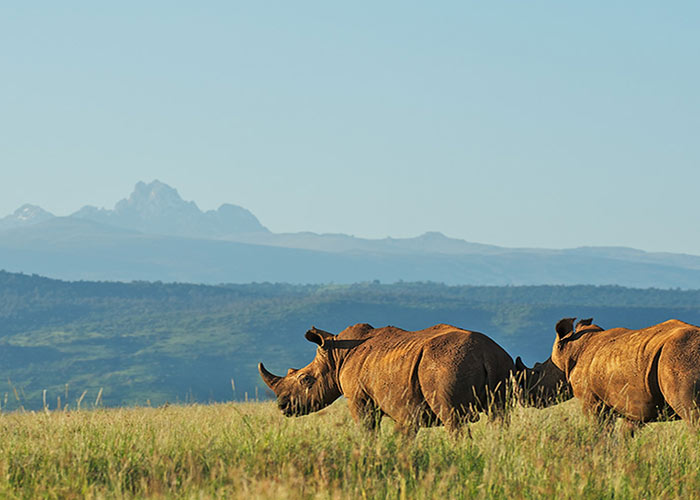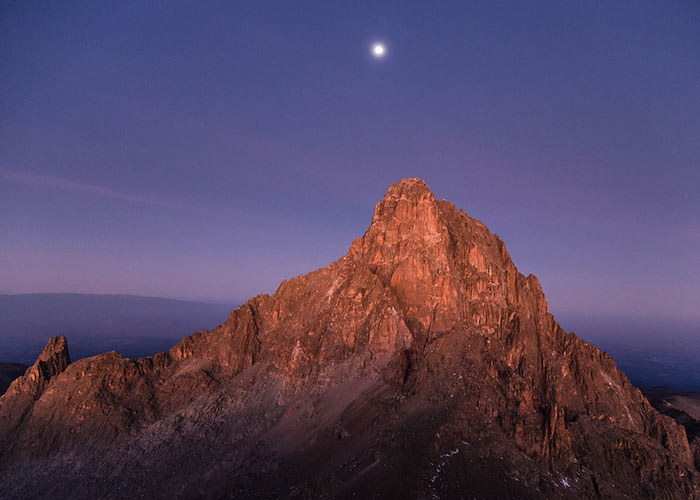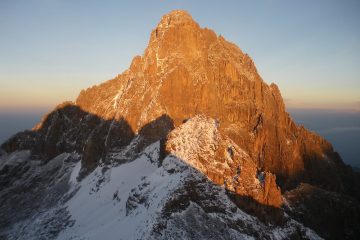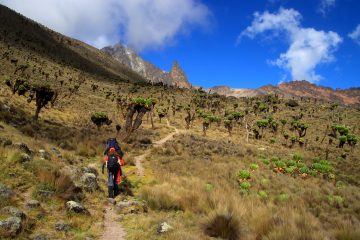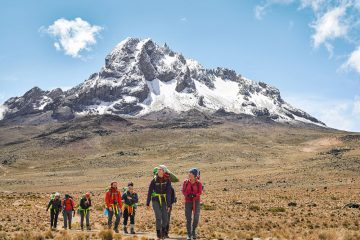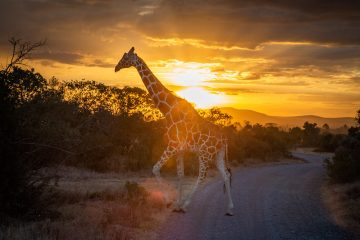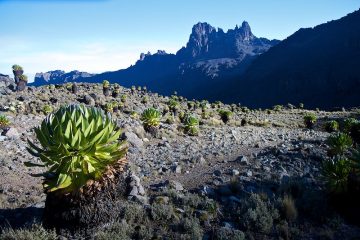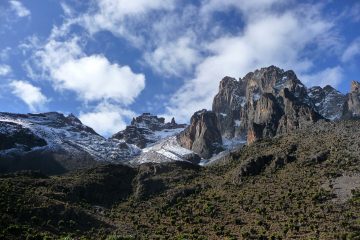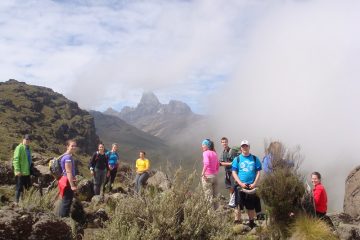Mount Kenya has influenced the customs of the people who live in its vicinity. The Kikuyu tribe, who dwell on the mountain’s southern and western flanks, regard Mount Kenya as the holy seat of their god, Ngai. Houses built by the Kikuyu used to have doorways that faced the sacred mountain.
The Kikuyu (also Agikuyu/ Gikuyu) are a Bantu ethnic group native to Central Kenya, while they are found in Tanzania in much smaller numbers. With a population of 8,148,668, they make up 17.13 percent of Kenya’s overall population, making them the country’s biggest ethnic group.
Meaning of Kikuyu
The term Kikuyu comes from the Swahili word Gikuyu.
The name “Gikuyu” comes from the word “Mukuyu,” which means “sycamore fig (Mukuyu) tree.” As a result, Agikuyu translates to “Children Of The Big Sycamore” in Kikuyu. The alternate name for Embu, Gikuyu, and Meru is Nyumba ya Mumbi, which means “House of the Potter” (or “Creator”)
The Kikuyu People and their History
Kikuyu, also known as Gikuyu or Agikuyu, are Bantu-speaking people who dwell near Mount Kenya in the highlands of south-central Kenya. The Kikuyu ethnic group totaled around 4,400,000 people in the late twentieth century, accounting for over 20% of Kenya’s total population. Gikuyu (also known as Agikuyu) is their own name.
In the 17th–19th centuries, the Kikuyu migrated from the northeast into their current homeland.
Intensive hoe cultivation of millet (the primary crop), peas, beans, sorghum, and sweet potatoes supported their traditional economy. Coffee, corn (maize), wattle, and fruits and vegetables are the most important contemporary cash crops. Irrigation and terracing were used by some cultures. Animal husbandry was a valuable addition.
The Kikuyu used to live in distinct domestic family homesteads, each of which included a hut for each woman and was bordered by a hedge or stockade. However, during the Mau Mau revolt of the 1950s, the British colonial authorities relocated the Kikuyu to villages for security concerns. Many Kikuyu chose to keep this structure once the emergency ended because of the economic benefits of village settlement and land consolidation.
The mbari, a patrilineal group of males and their wives and children ranging in size from a few dozen to several hundred people, is the local community unit. The people are split into nine clans plus a number of subclans beyond the mbari.
Kikuyu are also divided into age groups, which have historically served as the primary political institutions. Each year, new groups of males are introduced, eventually forming generation sets that dominate for 20 to 30 years. Traditionally, political power was vested in a council of elders representing a certain age class during its reign as ruler. The Kikuyu believe in an all-powerful creator god named Ngai, as well as the spiritual presence of their ancestors.
Mau Mau Rebellion by the Kikuyus
The Kikuyu were the first local ethnic group in Kenya to engage in anti-colonial agitation in the 1920s and 1930s, in response to European farmers and other immigrants’ colonization of their highlands. In 1952, they conducted the Mau Mau rebellion against British control, and later in the decade, they led the movement for Kenyan independence. They rose to the top of Kenya’s economic and political echelon after independence. Kenya’s first prime minister (1963–64) and president (1964–78) was a Kikuyu named Jomo Kenyatta. He was also one of the first Africans to earn a Ph.D. in anthropology from the London School of Economics and to publish an ethnography (Facing Mount Kenya, 1938).
Facing Mount Kenya – A Tribal Life of the Agikuyu
Kenyatta, Kenya’s first president, authored this colorful series of articles for Bronislaw Malinowski’s anthropology course at the London School of Economics, and they were published in Britain in 1938 as a monograph about the Kikuyu people’s life and traditions prior to colonial subjugation. Kenyatta set out to establish that Africans were “conditioned, by the cultural and social institutions of ages, to a freedom of which Europe has no conception,” by challenging the prejudiced preconceptions of settlers, missionaries, and colonial authorities. The colonizers had confiscated African farms under the pretense that tribal property was communal, despite traditional norms controlling individual land ownership, which Kenyatta describes in great detail.
Colonial control had brought the Kikuyu social order to rubble, and its inhabitants to serfdom, from an affluent, moral, and healthy way of life. This classic, like Chinua Achebe’s brilliant masterpiece “Things, Fall Apart” (1958), depicts the anguish of colonial “cultural contact” from an African perspective. Despite its author’s political undertone, it also holds its own among the major works of African ethnography.
Social Life + Kikuyu – Mount Kenya Politics
There were nine clans in the Agikuyu country. Each clan traced its roots back to a single female ancestor who was Mumbi’s daughter. The clans were not confined to any single geographical location; they coexisted. Some clans had a well-known chief, while others didn’t.
The ruling council of elders for each clan, however, wielded true political authority in both cases. The leader of each clan’s council was then forwarded to the community’s supreme council of elders. A headman or the nation’s representative led the overarching council of elders representing all the clans.
The Gikuyu are credited with being the first indigenous people to organize utilizing colonial-era structures such as voluntary societies, autonomous schools, and churches to fight British control. The Mau Mau colonial and civil war (1952–1956) fundamentally altered Gikuyu’s social fabric and cemented the process of Christian conversion.
Under the leadership of a Gikuyu president, Jomo Kenyatta (1963–1988), the war’s tragedy prepared the path for independence. Following Kenyatta’s death, Daniel Arap Moi, a Kalenjin, took over as president, ending Gikuyu elite socioeconomic and political advantages until his forced retirement in 2002. The elections were won by Mwai Kibaki, Moi’s former vice president, who returned power to the Gikuyu. His two periods in power were marred by corruption scandals—not uncommon in Kenya—and ethnic riots, which killed over a thousand lives in the aftermath of Kibaki’s close victory in the disputed 2007 elections. When Uhuru Kenyatta, the first president’s son, won the first round of the 2013 elections, political power stayed in Gikuyu’s hands.
Gikuyu people are still a diverse group, split by area, class, religion, and other factors. Among the well-known Gikuyu are Nobel Peace Prize winner Wangari Maathai and authors Koigi wa Wamwere and Ngugi wa Thiongo.
Mount Kenya & Kikuyu Religion
The Supreme Creator and Giver of All Things, Ngai or Mwene-Nyaga, is the Supreme Creator and Giver of All Things. He established the first Gikuyu settlements and gave them everything of life’s necessities, including land, rain, plants, and animals. The sun, moon, stars, comets and meteors, thunder and lightning, rain, rainbows, and the big fig trees are all manifestations of Ngai (Mugumo).
These trees were used as sites of devotion and sacrifice, and they marked the location where Gikuyu and Mumbi – the Giukyu’s forefathers according to folklore – initially resided at Mukurue wa Gathanga. Ngai has human traits, and while some think he resides in the sky or in the clouds, Gikuyu tradition claims that Ngai visits the world on a regular basis to check it, dispense blessings, and administer punishment. Ngai sleeps on Mount Kenya (Kirinyaga) and Kilimambogo (kiirma kia njahi) when he arrives. Thunder is thought to represent Ngai’s movement, while lightning is the weapon he uses to clear the path when traveling from one holy site to another. Ngai is said to have a home atop Mount Kenya, according to some.
According to mythology, while on an inspection trip of the planet, Ngai chose the mountain as his resting spot. Ngai then led Gikuyu, the first man, to the top of the mountain to show him the beauty of the land he was gifting him.
Related: The Chagga tribe of Mount Kilimanjaro
List of Famous Kikuyu People from Kenya
- Wangari Maathai, Nobel Laureate, the first African woman to win the Nobel Peace Prize, and the first environmentalist to win the prize. She is the first Kenyan woman to earn a Ph.D.
- Ngũgĩ wa Thiong’o, Gikuyu-language author, father of the author, and professor
- Uhuru Kenyatta, fourth and current President of Kenya, former Deputy Prime Minister. Expected to see out his two-term presidency on August 9th when Kenya goes to the polls.
- Rigathi Gachagua, politician and former vice-president of Kenya vied under the UDA party ticket together with William Samoei Ruto who is the new and 5th president of the republic of Kenya. He was impeached in 2024.
- Kithure Kindiki, politician, former Minister Interior, Cabinet Secretary for Interior and Administration of National Government and current Deputy President of Kenyaafter Rigathi Gachagua was ousted by impeachment in October 2024.
- Martha Wangari Karua, politician and former presidential candidate, and current key member and vice president hopeful in former prime minister Raila Odinga’s presidential campaign for Azimio -ODM party which lost in 2022 general elections.
- Ng’endo Mwangi, Kenya’s first woman physician. The Mwangi Cultural Center at the Smith College in Massachusetts is named in her honor.
- Wamuyu Wainaina, Assistant Secretary-General for Human Resources Management at the United Nations
- Helen Gichohi, ecologist and President of the African Wildlife Foundation
- Olive Mugenda, first woman to head a public university in the African Great Lakes region
- Thumbi Ndung’u, HIV/AIDS researcher and the first to clone HIV subtype C. Recipient of the Howard Hughes Medical Institute’s International Early Career Scientist award
- Dorothy Wanja Nyingi, ichthyologist and recipient of the Ordre des Palmes académiques (Order of Academic Palms)
- David Muchoki Kanja, the first Assistant Secretary-General for the Office of Internal Oversight Services at the United Nations
- Simon Gikandi, English professor at Princeton University
- Gibson Kamau Kuria, lawyer, and recipient of the Robert F. Kennedy Human Rights Award
- Paul Muite, lawyer, politician, multiparty activist, and former presidential candidate
- Maina Kiai, lawyer, human rights activist, and United Nations Special Rapporteur on the rights to freedom of peaceful assembly and of association
- Rebeka Njau, author and playwright. Her one-act play The Scar (1965), which condemns female genital mutilation, is considered the first play written by a Kenyan woman
- Binyavanga Wainaina, author, LGBT activist, and a winner of the Caine Prize for African Writing
- Boniface Mwangi, photojournalist and sociopolitical activist
- Wanuri Kahiu, film director
- Wahome Mutahi, a humorist popularly known as Whispers after satirical column he wrote
- Jeff Koinange, Emmy Award-winning journalist
- Julie Gichuru, news anchor and entrepreneur
- Liza Mũcherũ-Wisner, a semi-finalist in The Apprentice Season 10
- Edi Gathegi, stage, film, and television actor
- Tom Morello, Grammy Award-winning guitarist, son of Ngethe Njoroge
- Eric Wainana, musician
- Janet Mbugua, news anchor
- Patrick Ngugi Njoroge, Governor of the Central Bank of Kenya
- Samuel Kamau Macharia, founder and chairman of Royal Media Services, the largest private radio and television network in Eastern Africa
- James Mwangi, group CEO and largest individual shareholder at Equity Group Holdings Limited
- Chris Kirubi, industrialist and largest individual shareholder at Centum Investment Company Limited, the largest listed private equity firm in East Africa
- Sam Thenya, founder and group CEO at Nairobi Women’s Hospital
- Betty Muthoni Gikonyo, co-founder and group CEO at Karen Hospital
- Simon Gicharu, founder of Mount Kenya University, East and Central Africa’s largest private university
- Tabitha Karanja, founder and CEO of Keroche Breweries, Kenya’s second-largest brewery
- Paul Wanderi Ndung’u, entrepreneur and co-founder of SportPesa, one of the first African businesses to sponsor a Premier League team
- Esther Muthoni Passaris, businesswoman and politician
- Dorcas Muthoni, an inductee to the Internet Hall of Fame
- Joseph Mucheru, former Google Sub-Saharan Africa Lead and current Cabinet Secretary for ICT in Kenya
- Waiyaki wa Hinga, 19th century leader
- Waruhiu Itote also known as General China. Mau Mau resistance leader
- Bildad Kaggia, freedom-fighter and politician. Member of the Mau Mau Central Committee and the Kapenguria Six
- Mutahi Kagwe, politician
- Josephat Karanja, former Vice-President
- Lucy Muringo Gichuhi, first person of Black African descent to be elected to the Australian Parliament
- Kung’u Karumba, freedom-fighter and member of the Kapenguria Six Njenga Karume, politician and businessman
- Peter Kenneth, politician, businessman and former presidential candidate
- Jomo Kenyatta, first President of Kenya, father of Uhuru Kenyatta
- Margaret Kenyatta, fourth and current First Lady of Kenya, wife of Uhuru Kenyatta
- Ngina Kenyatta (Mama Ngina), former First Lady, wife of Jomo Kenyatta, mother of Uhuru Kenyatta
- Lucy Kibaki, former First Lady, wife of Mwai Kibaki
- Mwai Kibaki, third President of Kenya Dedan Kimathi, Mau Mau resistance leader
- Mbiyu Koinange, former Minister of State, brother-in-law of Jomo Kenyatta, first Kenyan holder of a master’s degree
- Moses Kuria, Member of parliament, Gatundu South.
- Eliud Mathu, first African member of the Kenyan Legislative Council (LegCo)
- Kenneth Matiba, businessman, politician, multiparty activist and former presidential candidate
- John Njoroge Michuki, politician and businessman
- Githu Muigai, Attorney General
- Sabina Chege, politician
- Moses Kuria, politician
- Kimani Ichung’wah, politician
- Kimani Wamatangi, politician
- Njoroge Mungai, politician and businessman. Personal doctor and first cousin to Jomo Kenyatta
- Njoki Susanna Ndung’u, Judge of the Supreme Court of Kenya
- Charles Njonjo, former Attorney General and Minister for Constitutional Affairs
- George Saitoti, former Vice-President Harry Thuku, freedom-fighter, and Independence Hero
- Anne Waiguru, former Cabinet Secretary for Devolution and Planning and a key member of the current Deputy of President, William Ruto’s UDA party presidential campaign.
- Manasses Kuria, second African Anglican Archbishop.
- John Njenga, Archbishop of the Roman Catholic Church
- Samuel Wanjiru, first Kenyan to win the Olympic gold medal in the marathon, 2008 Beijing Olympic Marathon Champion, 2009 London and New York Marathon Champion, 2009 Rotterdam Half Marathon champion
- John Ngugi, World Cross Country Champion four consecutive titles between 1986 and 1989 and five titles overall. 1988 Olympic Champion 5000 metres
- Catherine Ndereba, four-time Boston Marathon Champion, Olympic marathon silver medalist in 2004 and 2008.
- Henry Wanyoike, Paralympics Gold medalist over 5,000 meters, holder of various marathon and half marathon records
- Douglas Wakiihuri, 1987 World Championships in Athletics Marathon Champion, 1988 Olympic Marathon silver medalist, 1990 London and New York Marathon Champion
- Patrick Njiru, rally driver with Subaru World Rally Team
- Joseph Gikonyo, 100 and 200 metres sprints gold medalist at 1990 African Championships.
- Boniface Tumuti, 400 metres hurdles gold medalist at the 2016 African Championships, silver medalist at the 2016 Olympics.

